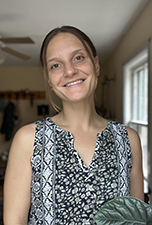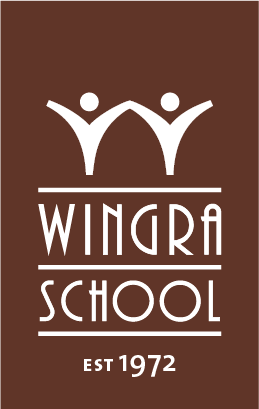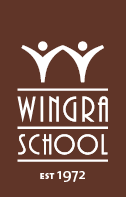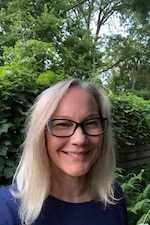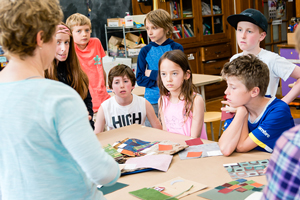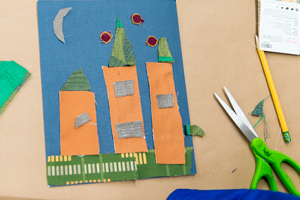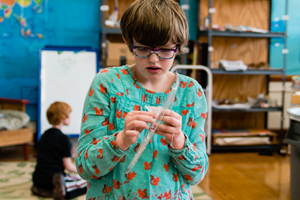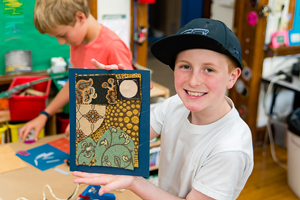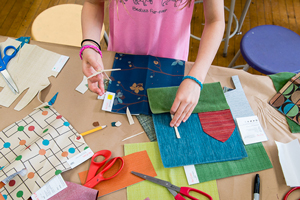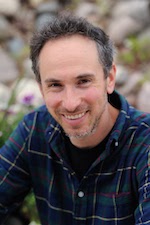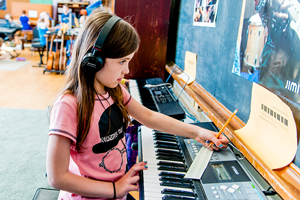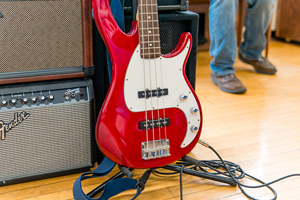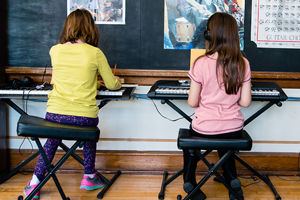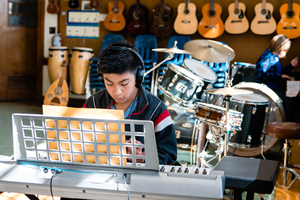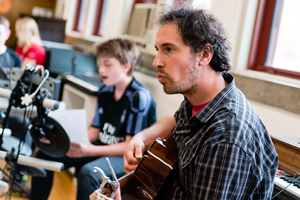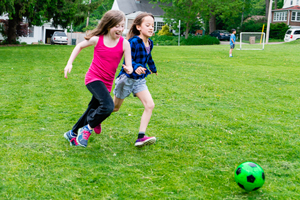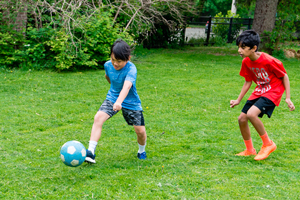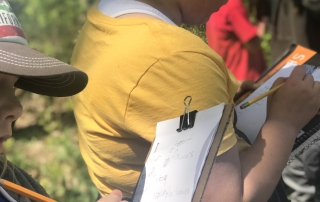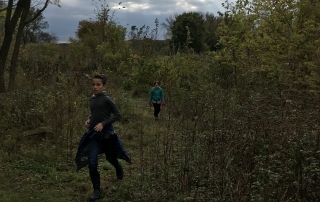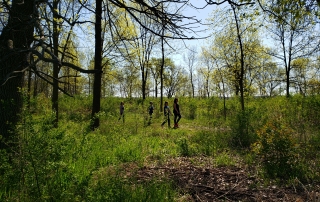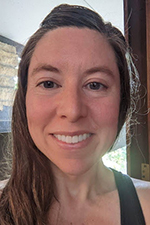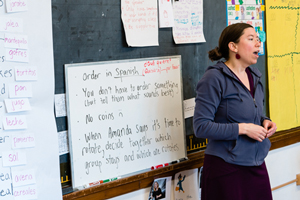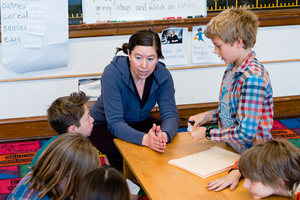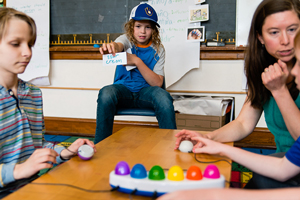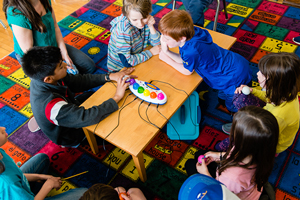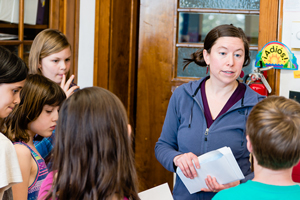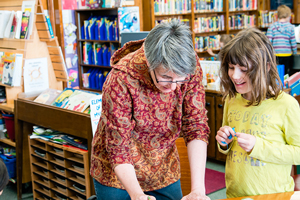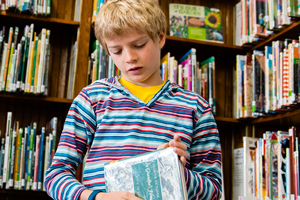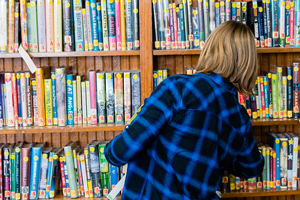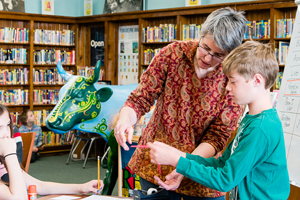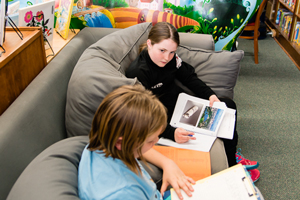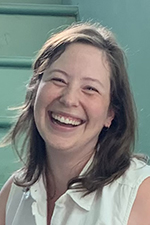The Lake (Ages 9–11)
The Lake is our program for 9, 10, and 11, year-olds. Thematic units integrated with Service Learning goals will deeply engage your child with topics relevant to their lives and connected to their interests. Weekly plan sheets, work times, managing the school store, and more complex Independent Projects teach important organizational skills to support your child’s budding confidence and independence.
Spending two years with the same teachers means your child is deeply known and understood.
Our classrooms allow for multi-age collaboration and experiences along a continuum of growth where students can take risks and responsibility, set and meet goals, overcome challenges, and deepen friendships in a safe and supportive environment. Spending two years in the Lake means your child is known and understood; the Lake teachers strive to form connections and relationships with every individual and family.
One of the things we most appreciate about the Lake program is providing a successful balance between letting our child be a child while also encouraging independence, responsibility, and accountability. —Elizabeth, Wingra parent
Our Approach
LITERACY
At Wingra, we believe that the learning environment in which literacy instruction takes place is critical to students’ success. We recognize that intellectual maturation and growth are naturally uneven processes and that children’s reading styles, skills and preferences vary in both their own development and in comparison with their classmates. Reading, writing, speaking, observing, thinking, and listening are natural processes of communication that are integrated into every school day and throughout the curriculum; we emphasize the language processes in all content areas. The Lake literacy program establishes high expectations for all students while ensuring a safe classroom environment that encourages students to take risks. Many Lake-age students are still transitioning from beginning readers to fluent readers, who read for pleasure, information, direction, and content throughout the day. Our goal is to build autonomy of earlier skills while focusing on strategies like comprehension monitoring, making connections, and inferring. We acknowledge the differences in children’s development and scaffold these processes to the individual and small group. In the Lake, we believe that reading, writing, listening, and speaking are naturally connected and emphasize that both informal and formal language are important forms of learning and communicating.
MATH
The major purpose of mathematics in the Lake is to help children understand and interpret their world and solve problems which occur in it. We call this “math literacy.” In the Lake, we strive to create an environment that encourages children to explore, conjecture, develop, test, discuss, and apply ideas in their world. We approach mathematics as an integrated whole, not simply a set of isolated topics.
In all Wingra classrooms, math instruction takes place daily in individual, small group, or whole class lessons. At Wingra, we work hard to foster what mathematicians describe as “number sense.” Beyond knowing how to use standard algorithms, students learn multiple approaches and why they work. We believe that learning the facts, rules, and methods within a context of deep understanding improves retention, promotes fluency, and facilitates future mathematical learning.
SCIENCE
Children are natural scientists. They are curious and love to explore their surroundings. Science is integrated into every unit. In this way, children can see the interconnectedness of science, math, literacy, social studies, and the greater world. At this age, students are eager to physically interact with materials, go more in depth with concepts, and explore abstract ideas.
Students generate questions within each unit. Explorations and activities are planned based on student interests. In the Lake, students focus on problem-solving and hands-on science activities. Mixed-age and mixed-ability groups work together to investigate hypotheses and share their findings. They grow in their ability to represent and interpret data, keep records, and use reference materials.
In order to create a balanced science program in the Lake, we include studies of physical, biological and ecological sciences. Lake science content includes, but is not limited to, the study of simple machines and physics; organisms and their environments; plant, animal, and mineral identification and classification; properties and changes of properties in matter, light and heat; electricity and magnetism; biomes and habitats; science and technology; structures and functions in living systems; cells, tissues, and systems; metric measurement; and Earth and space science.
SOCIAL STUDIES
“Independence” is an overarching theme at the Lake level and learning to think independently is a key concept within our Social Studies curriculum. Nine-, ten-, and eleven-year-olds are can look beyond their self-centric, or family-centric viewpoints. They already have a basic understanding of social justice issues – these are visible, and have been explored and discussed in the Nest and Pond. At this level, they begin to dig more deeply into the experiences of other families, cultures and civilizations in modern and historic times, which may have fundamentally different traditions and viewpoints than they do. This sets the stage for in-depth perspective taking in the forms of writing, discussions, debates, and simulations. Central to this is listening and practicing respectful discourse. We operate as a democratic classroom community with real-world contexts and integrated curriculum across subjects. In the Lake, students actively investigate economic systems, historical events, technological advances, and geography in order to deepen their own understanding, which forms the basis for understanding others.
SOCIAL JUSTICE
At this age, students are able to identify the qualities and characteristics that make them unique. They begin to recognize the privileges and opportunities they have. Students are beginning to notice ideas and concepts that are different from their own. This can cause them to reevaluate and reflect on their own long-held viewpoints. The Lake provides a safe space to explore and experience changing ideas. These experiences and topics are embedded within each unit of study and curriculum area. Using simulations, debates and research, we explore the experiences of historically underrepresented groups.
VISUAL ART
Danya Lanphear// Art Teacher
Lakers come to the art room ready for a challenge. By now, kids have developed an identity as an artist across many skill levels. They can interpret the lessons personally while still following steps and guidelines. In a student-collaborated curriculum, the student’s needs and artistic goals are a key part of projects and instruction. Children are continually encouraged to make mistakes, experiment, play, take risks, cultivate open-mindedness, and recognize problems both formal and conceptual. Students in the Lake have an increased sense of self, personal strengths and areas where support is needed. Creative choice, coupled with responsive teaching, result in an authentic student-centered practice to support this developmental stage. This structure naturally promotes differentiation within the curriculum, and allows each child the opportunity to make choices based on his/her own artistic inspiration and passion. Children of this age are keenly aware of social justice and there are many opportunities to apply these themes to the working group. Individual expression comes with a responsibility to speak your mind and heart appropriately. Student discussion provides time to share inspirations and make connections to previous lessons and projects.
MUSIC
Aviv Kammay // Music Teacher
Lake students are explorers of musical phenomena, users of practical skills on a variety of instruments, and imaginative creators of musical works. Our Lakers analyze musical form and arrangements, collaborate in composing and notating, and prepare their music for performance and recording. For musical inspiration, they tap into a wide and diverse pool of sources: music that is a part of their personal or group identity, music that reflects the experiences of others, and music that confronts with social and political issues of injustice and oppression. The Lake music curriculum is an invitation to master several useful skills including basic guitar and keyboard technique, standard music notation, and the principles of form and balance in arrangement and composition.
Instruments available for the students include pianos, keyboards, recorders, guitars, ukuleles, lap-harps, computers with recording and notation software, pitched and non-pitched percussion, electronic drum set, and more.
HEALTH & WELLNESS
The Lake PE program is designed to help guide the students in discovering the joys and emotional benefits that come from play, teamwork, sportspersonship, perseverance, cooperation, effort and achievement. Class periods alternate between sport related skills and cooperative play and teamwork. Teaching friendly and inclusive game play and movement plants the seeds for lifetime love of physical activity. Individual physical development and progress is equally as important as effort, interest, and participation. We invite students to contribute their ideas to the curriculum and play. Student voice is an important component of the activities we choose and the guidelines or rules of the game. Integration with classroom thematic units and other all-school programming happens as often as possible.
Students in the Lake have an increased responsibility to include all classmates in the game and to advocate for balanced teamwork for themselves and others. We continue to emphasize that exercise, sports and competition should be a positive experience for everyone and a shared celebration of abilities and accomplishments. Through a wide variety of activities and learning goals students build upon their foundational understanding of how their bodies work to maintain and improve upon their physically active and healthy lifestyles. Students are able to have fun while learning to respect one another, challenging themselves and setting personal goals in an environment that is physically and emotionally safe.
SPANISH
Amanda Pool // Spanish Teacher
Lake Spanish reflects best practices in both world language and progressive education in a variety of ways. Students are exposed to large amounts of rich comprehensible input in Spanish – spoken language made accessible by careful word choice, repetition, gestures, and visuals – to strengthen their ear for the language. The language ear is an intuitive understanding of the inherent patterns, sounds and procedures in a language, an invaluable base for all further study. They have ample opportunity to work individually and in pairs, following their personal work rhythms while also encouraging collaboration. Games, drama, music and illustration all play an integral role in bringing the language to life and activating all learning pathways. As much as possible, student interests inform the topics and approach to study.
Social justice concepts guide Lake Spanish work in multiple ways. Lake students are regularly exposed to other cultures, their traditions and ways of life through books, music, videos and artifacts. They are encouraged to practice interest, respect and open minds in exploring these cultures and comparing them to their own. They discuss stereotypes such as “all Spanish-speaking cultures are the same” and examine different perspectives on cultural practices. They also learn about historical and contemporary figures such as Sonia Sotomayor who worked to stop unfairness and make a difference. The classroom community embodies social justice as all members treat one another with fairness and support one another in “giving it a try,” and celebrating each other’s successes. Work is evaluated based on individually chosen goals and the continuum of language acquisition, rather than a quantitative system, and students meet one-on-one with the teacher to discuss progress and needs.
LIBRARY
Dana Prager // Librarian & Literacy Teacher
The Wingra Library seeks to support Lake students who tend to be increasingly skilled writers and voracious readers, enjoying lengthier stories with descriptive language and social justice themes. Nine to eleven year olds have an increased awareness of relationships of power and privilege and how they impact characters in stories as well as people in real life. Graphic novels and diaries are popular leisure time reading choices. Lake students have formal and informal opportunities to read and memorize poetry as well as write and put on plays. They appreciate opportunities to explain things to peers and younger students and are especially good at reading to younger children. In their own writing, Lake students often use more dialogue with increasingly realistic interactions between characters. They excel at journaling, poetry writing, and creating cartoons. Their revision skills are becoming more refined as they continue to improve their skills as peer editors. Many students increasingly choose to read non-fiction and biography texts related to subjects of interest. They are able to do research from a variety of sources at this level.
Lake Teachers
Rachel Detra (she/her)
Lake Teacher, Ages 9 to 11
B.S., English, UW-Madison
M.S., Education, Stanford University
Rachel is a Madison native and mom to two little girls. For most of her career in education, she taught high school English at a large high school in San Jose, California. She’s also held roles as Instructional Equity Coach and University Supervisor. Joy and humanity are what she centers in classrooms and why she is so excited to join the Wingra community.
